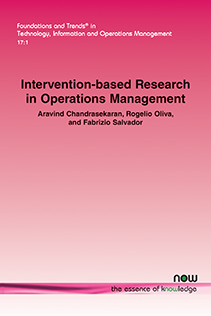Intervention-based Research in Operations Management
By Aravind Chandrasekaran, Fisher College of Business, The Ohio State University, USA, chandrasekaran.24@osu.edu | Rogelio Oliva, Mays Business School, Texas A&M University, USA, roliva@tamu.edu | Fabrizio Salvador, IE Business School, IE University, Madrid, Spain, fabrizio.salvador@ie.edu
Abstract
Intervention-Based Research (IBR) is a research method where scholars closely interact with practicing managers in understanding and solving complex problems, with the ultimate goal of generating novel theoretical insights. IBR calls for researchers to be actively involved in the problem-solving process, rather than observing it unobtrusively—as required by alternative approaches. IBR is particularly relevant and promising for Operations Management (OM) scholars, whose mission is to engage with practice to provide working solutions to operational problems. This fact is echoed in the rising interest among OM scholars for the application of IBR, the creation of IBR departments at the leading journals, as well as the publication of several articles using this novel research method. Yet researchers may struggle to find complete guidelines for designing and executing IBR projects. This monograph is meant to provide doctoral students and OM scholars with an overview of this research method. In Section 1, we make the case for the need for IBR, discuss its relation with engaged scholarship, and compare it with other commonly used research methods. In Section 2, we clarify the epistemological underpinnings of IBR by discussing how it supports abductive reasoning in theory building, and by exploring what is needed, from the researcher and the context situation, for IBR to yield theoretical insights. Section 3 outlines a typical process that researchers can follow when conducting IBR, presents strategies that researchers can take to reduce uncertainty and risks during their engagement, and illustrates some of the best practices that can lead to stronger engagement with the problem. Section 4 showcases recently published IBR papers in OM and uses these papers to help the reader grasp concrete examples of the fundamental methodological tenets of IBR. We conclude by synthesizing the threefold benefits of IBR of solving a problem from the field, generating theoretical insights, and educating aspiring managers on the problem and its solution.
Intervention-based Research in Operations Management
Intervention-based research (IBR) is a research method where scholars closely interact with practicing managers in understanding and solving complex problems with the ultimate goal of generating novel theoretical insights. IBR calls for researchers to be actively involved in the problem-solving process and is particularly relevant and promising for operations management (OM) scholars, whose mission is to engage with practice to provide working solutions to operational problems. This is echoed in the rising interest among OM scholars for the application of IBR yet researchers may struggle to find complete guidelines for designing and executing IBR projects.
This monograph provides doctoral students and OM scholars with an overview of this novel research method. The authors make the case for the need for IBR, discuss its relation with engaged scholarship, and compare it with other commonly used research methods. They clarify the epistemological underpinnings of IBR by discussing how it supports abductive reasoning in theory building, and by exploring what is needed for IBR to yield theoretical insights. Furthermore, they outline the process that must be followed by researchers when conducting IBR, present strategies that can reduce uncertainty and risks during their engagement, and illustrate some of the best practices that can lead to stronger engagement with the problem. The authors also present recently published IBR papers in OM and use these papers to help the reader grasp concrete examples of the fundamental methodological tenets of IBR. The monograph concludes by synthesizing the threefold benefits of IBR of solving a problem from the field, generating theoretical insights, and educating aspiring managers on the problem and its solution.
